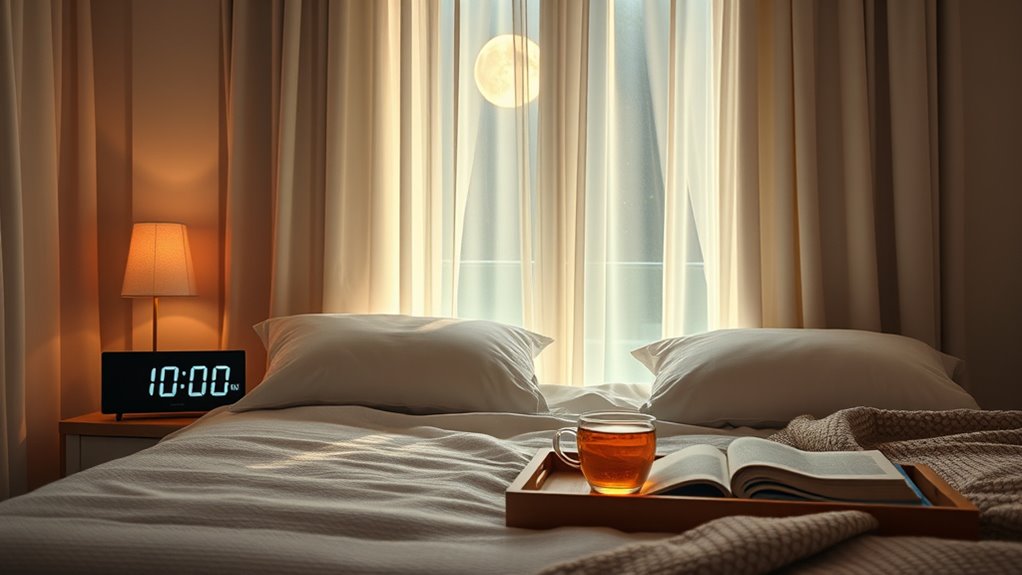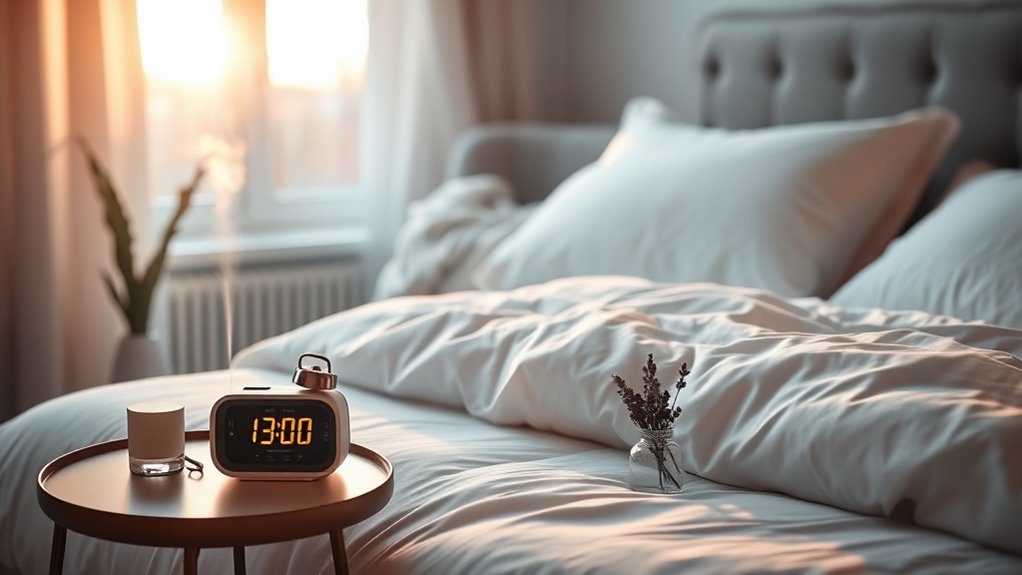In just 10 minutes, you can set the stage for better sleep by dimming your lights an hour before bed and ensuring your room is cool, between 60-67°F. Clear clutter and remove electronic distractions to create a calming space. Establish a consistent bedtime routine with relaxing activities like gentle stretches or deep breathing. Prioritize a cozy, dark environment and avoid screens. Keep going to discover more simple tweaks that can make a big difference in your sleep quality.
Key Takeaways
- Dim lights an hour before bed and use blackout curtains to promote melatonin production.
- Keep your bedroom cool (60-67°F) and clutter-free to create a calming environment.
- Establish a consistent sleep schedule and engage in relaxing activities during the last 30 minutes.
- Avoid screens and blue light, opting for calming routines like reading or deep breathing.
- Use comfortable bedding and remove electronic distractions to enhance sleep quality.
Quick Tips to Enhance Sleep Environment and Routine

Getting a good night’s sleep doesn’t have to be complicated or time-consuming. In just ten minutes, you can make simple changes to improve your sleep hygiene and wake up feeling more refreshed. One of the most effective ways to do this is by focusing on your sleep environment. Your bedroom should be a sanctuary dedicated to rest. Start by optimizing the lighting—dimming the lights an hour before bed helps signal your body that it’s time to wind down. Use blackout curtains or an eye mask to block out any ambient light, which can interfere with your melatonin production. Keep the room cool, ideally between 60 and 67 degrees Fahrenheit, as a cooler environment promotes better sleep. Remove distractions like TVs, smartphones, or work-related items from your sleep space. These can create mental clutter and make it harder to relax. Instead, create a calming atmosphere with soothing colors, comfortable bedding, and minimal clutter. This will help your body and mind associate the bedroom with rest rather than stress or activity. Additionally, being mindful of your sleep hygiene habits can greatly enhance your sleep quality over time.
Alongside your sleep environment, paying attention to your bedtime routines can markedly improve your sleep quality. Establishing a consistent routine helps regulate your internal clock, making it easier to fall asleep and wake up naturally. Spend the last 30 minutes before bed engaging in calming activities—reading a book, taking a warm bath, or practicing gentle stretches. Avoid screens during this time, as the blue light emitted from phones and tablets suppresses melatonin production, making it harder to sleep. Instead, opt for relaxing music or deep breathing exercises to signal to your body that it’s time to unwind. Consistency is key, so try to go to bed and wake up at the same time every day, even on weekends. This consistency reinforces your circadian rhythm, making falling asleep easier over time. Additionally, avoid caffeine and heavy meals close to bedtime, as these can disrupt your sleep or cause discomfort.
In just ten minutes, you can make a tangible difference by refining your sleep environment and establishing a calming bedtime routine. Small adjustments like dimming the lights, removing distractions, and engaging in soothing activities can set the stage for restful sleep. Remember, the goal is to create a space and routine that signal to your body it’s time to relax and recharge. With these simple steps, you’ll find it easier to drift off each night and wake up feeling more energized and ready for the day ahead.
Frequently Asked Questions
How Long Does It Take to See Improvements in Sleep Quality?
You might notice sleep improvement within a few days to a week after implementing simple changes. However, gradual benefits often take about two to four weeks as your body adjusts. Consistently following good sleep hygiene habits accelerates progress. Be patient and stay committed, because sustainable improvements in sleep quality come from steady effort over time. Keep track of your progress to stay motivated as you enjoy better, more restful sleep.
Can Sleep Hygiene Tips Help With Insomnia or Only General Sleep Issues?
Think of your sleep environment as a cozy nest—tightening the fit with good sleep hygiene can help even stubborn insomnia. While tips like maintaining bedtime consistency and creating a calming space often improve general sleep issues, they can also ease insomnia for many. These habits lay a foundation for better rest, but if insomnia persists, consulting a professional guarantees you get tailored support.
Are There Specific Foods or Drinks That Disrupt Sleep Hygiene?
Yes, certain foods and drinks can disrupt your sleep hygiene. Caffeine consumption, especially late in the day, can make it harder to fall asleep. Alcohol intake might initially make you feel sleepy but often leads to fragmented, poor-quality sleep. To improve your sleep hygiene, avoid caffeine after mid-afternoon and limit alcohol intake in the evening. Instead, opt for calming herbal teas or water to support restful sleep.
How Do Sleep Routines Vary for Shift Workers or Irregular Schedules?
Shift work challenges require tailored sleep routines. You should create irregular schedule strategies like maintaining consistent sleep times, even on days off, and using blackout curtains to block light. Prioritize wind-down rituals before sleeping and limit caffeine intake. Adjust your environment for ideal rest, and consider naps strategically. These steps help your body adapt to irregular schedules, improving your sleep quality despite the demands of shift work.
What Are the Signs That Sleep Hygiene Adjustments Are Working?
You might notice your sleep pattern improves if you fall asleep faster and wake up feeling more refreshed. Rest quality increases when you experience fewer nighttime awakenings and feel more energized during the day. Don’t worry if progress feels slow; consistency matters. Keep monitoring your sleep, and you’ll see signs that your sleep hygiene adjustments are working, like deeper sleep and better overall well-being.
Conclusion
Remember, just a quick 10-minute tweak can substantially improve your sleep. Did you know that creating a consistent sleep routine can boost your sleep quality by up to 50%? By optimizing your sleep environment and sticking to simple habits, you’re giving yourself the best chance for restful, restorative sleep every night. Don’t underestimate the power of these small changes—they can make a big difference in how you feel each day. Start your tune-up tonight!










